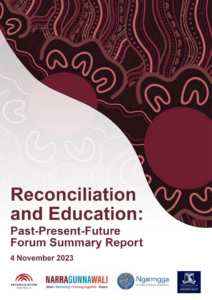Summary
The Reconciliation and Education: Past-Present-Future forum brought together key education leaders and stakeholders from every state and territory in the teaching of First Nations histories and cultures.
Co-hosted by Reconciliation Australia’s Narragunnawali program and the University of Melbourne’s Ngarrngga program, the forum explored the past, present and futures of education, and considered the challenges and successes that demand attention as the collaborates to drive a stronger future of reconciliation both in and through education.
The report highlights four recommendations:
Build on past work: to understand deeply and critically – and to actively acknowledge – the history of Aboriginal and Torres Strait Islander education and the people and organisations who have contributed to this history-making.
Strengthen education policy and implementation: actively focus on the importance of revisiting, strengthening, and re-committing to education policy that can further reconciliation, with First Nations voices and perspectives at the core of policy and decision-making processes.
Sector coordination: work to develop a coordinated and collaborative sector approach toward shaping and actively committing to shared goals, including mapping and modelling how the system can advocate for positive change in Indigenous education and towards reconciliation.
Resource reconciliation: ensure additional targeted financial and non-financial resources – and corresponding policies and commitments of governments – are provided to support teachers and school communities to implement the aspirations of Aboriginal and Torres Strait Islander people in their work and practice.



